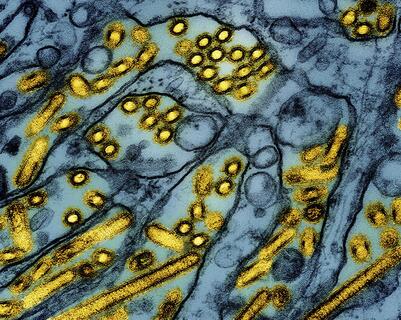Oregon kitten contracts bird flu, is euthanized
Published 1:55 am Monday, January 27, 2025

- This colorized electron microscope image released by the National Institute of Allergy and Infectious Diseases on March 26 shows avian influenza A H5N1 virus particles, in yellow, grown in Madin-Darby Canine Kidney epithelial cells, in blue. (CDC/NIAID)
An outdoor kitten exposed to wild waterfowl near a wildlife refuge in Washington County recently tested positive for highly pathogenic avian influenza.
The cat was euthanized by a veterinarian because of the severity of its symptoms and its case was then was reported to the state, said Ryan Scholz, state veterinarian.
Cats are not a species the state would euthanize if they were infected with avian influenza, Scholz added.
Trending
The young kitten’s immune system hadn’t fully developed and adult cats living with it did not get sick.
More attention, more cases
Scholz said increased attention has led to more avian influenza cases in cats because owners are reporting symptoms to veterinarians, leading to more testing.
“That doesn’t equate to increased risk,” he added.
Though cats, including both domestic and wild cats, are particularly sensitive to H5N1 avian influenza, Scholz said bird flu doesn’t pose great danger to most healthy backyard pets, which can recover from symptoms.
“I don’t think there’s significant risk there to a random outdoor cat,” he said, in part because songbirds don’t carry this virus.
People also probably aren’t at risk from infected felines. “All of the evidence points to cats being a dead end host. They don’t shed the virus,” Scholz said.
Trending
Dogs also can contract bird flu, though they appear less susceptible to the virus than cats.
Other, more common diseases should be of more concern to pet owners, Scholz said.
The kitten’s case
When brought to a veterinarian, the kitten had a fever, runny nose and eyes, lethargy, difficulty breathing and loss of appetite and was diagnosed with pneumonia, according to an Oregon Department of Agriculture news release.
The confirmed diagnosis came through a collaboration with ODA, the Oregon Veterinary Diagnostic Laboratory at Oregon State University and the USDA National Veterinary Services Laboratories.
While a complete genome sequencing is pending, preliminary tests confirm the H5N1 virus the cat contracted was not the strain circulating in dairy cattle in other states.
Other mammals
While Oregon has had more than 900,000 birds impacted by avian influenza, Oregon has no confirmed cases of H5N1 in cattle to date.
However, the state has had one human case of avian influenza, as well as six other mammal species.
Besides domestic cats, there have been pigs, skunks, a red fox, a marten and a raccoon infected with the virus, said Kurt Williams, director of the Oregon Veterinary Diagnostic Laboratory.
Public health officials are becoming more concerned about HPAI as it spreads in other mammal species, Williams said.
“This virus, unfortunately, isn’t going anywhere,” he added.
Protecting pets
Here are tips to help protect your pet from H5N1:
• Do not feed your pet undercooked or raw meat, including uncooked or freeze-dried meat-based diets, treats, or animal products.
• Do not feed your pet raw (unpasteurized) milk or colostrum.
• Keep pets away from wild birds, poultry, and cattle (especially in areas with known H5N1 outbreaks).
• Prevent pets from eating birds or other wild animals.
• Wash your hands after touching raw meat and after interacting with poultry, livestock or animals outside your household.
• Consider changing clothing and shoes after interacting with animals or birds with unknown health status and before interacting with your own pets.
• Contact your veterinarian if your pet appears sick. Tell your veterinarian if your pet has been exposed to any of the above.
Veterinarians must immediately report any suspected cases of influenza in animals to the Oregon Department of Agriculture.





